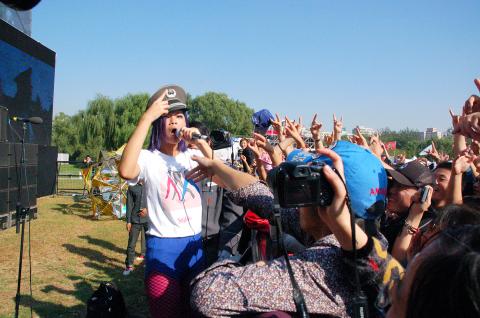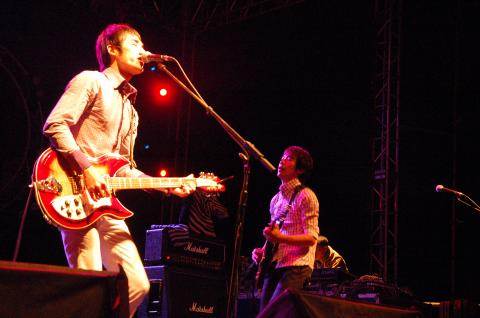Austin’s SXSW (South by Southwest) music festival, which will take place for the 25th time from Tuesday to March 21, has become a supersized mecca for indie music. With around 2,000 bands performing in 90 venues over seven days, it may be the world’s largest indie music festival, and it is certainly one of the most open, with acts ranging from they’re-not-dead-yet legends like Duran Duran and Wu-Tang Clan to scores of bands, DJs, rappers and singers you’ve almost certainly never heard of.
In the fall, when I asked the lead singer of the Japanese band Guitar Wolf, Seiji Anno, about SXSW, he replied, “It used to be great. Now … pure chaos!”
But somewhere in there, of course, is the absolute cutting edge of what’s next. Parties will be thrown by hipster bellwethers, like the New York-based The Fader magazine. Scouts from Fuji Rock, Glastonbury and other top international festivals go every year to book summer programming.

Photo Courtesy of Gauilunak
In all, bands will travel to the festival from more than 60 countries — and now, largely thanks to a new government initiative, this includes Taiwan.
Over the next two weeks, 10 Taiwanese bands, most of which usually play small local clubs like Underworld (地下社會) and The Wall (這牆), will travel to two of North America’s biggest city-based music festivals, SXSW and the Canadian Music Week in Toronto, which started yesterday and runs through Sunday, and a New York City showcase on Tuesday. Six of the bands — Tizzy Bac, Wonfu (旺福), Echo (回聲樂團), Fire Ex (滅火器), Sugar Plum Ferry (甜梅號) and Orangegrass (橙草) — will be completely funded by Taiwan’s government, while another four bands — Go Chic, White Eyes (白目樂隊), Unfamiliar Friends Party (不熟的朋友派對) and Aphasia (阿飛西雅) — will travel to SXSW on their own coin.
The funding for this rock tour comes via a new law that aims to bolster Taiwan’s image and boost cultural exports. Early last year, Taiwan’s legislature passed the Cultural and Creative Industries Development Act (文化創意產業發展法), which earmarked NT$2.1 billion for a five-year action plan called the Pop Music Flagship Project to support the local music industry. Most of this will go to indie bands.

Photos courtesy of GIO
Last year, the Government Information Office provided cash to 62 indie bands to record albums or EPs and funded at least a dozen musical acts to tour to international festivals.
Aboriginal singer Panai (巴奈) and geek chic pop singer Crowd Lu (盧廣仲) performed at the Midem Festival in France. Tizzy Bac and Sodagreen (蘇打綠) played a rock festival in Liverpool, England. Rocker Wu Bai (伍佰) took the stage at a festival in Incheon, South Korea, while four other Taiwanese bands did a three-city tour of Canada, and still three other local bands trekked up to Beijing for the Modern Sky Festival. The Aboriginal reggae band Matzka (瑪斯卡) was named a “national cultural ambassador” and toured through Taiwan’s diplomatic allies in Central and South America.
GIO head Johnny Chiang (江啟臣) told the Taipei Times the idea is to use “soft power” to give Taiwan’s international image a makeover.

Photos courtesy of GIO
“Taiwan makes computers, everybody knows that,” says Chiang, “but we also want people to know that Taiwan produces music, fashion and design. Going forward, we want to promote culture as a way of increasing Taiwan’s international exposure.”
A national program for indie rock? In the past, cultural exports meant classical music, ancient Chinese art and highbrow performance, like the Cloud Gate Dance Theatre (雲門舞集).
So is Taiwan’s government suddenly getting (gasp) cool?

Photos courtesy of GIO
Chiang says the Creative Industries Act (as it’s often abbreviated) mainly targets pop culture industries, like film, TV, video games, music and publishing. Countries like South Korea and the UK have devoted considerable government support to creative industries, and such programs have been economically rewarding.
“We want to build on the foundation of Taiwan’s pop music industry,” says Chiang, “which is still the main driving force in Mandarin popular music.”
Other parts of the initiative include the 2010-christened Golden Indie Music Awards (金音創作獎), a rather dull affair that gives cash prizes to local bands, and provides funds for producing and marketing artists — one such award has already gone to Hebe Tien (田馥甄) of the pop girl group S.H.E. Chiang also said he wants to turn the Golden Melody Awards (金曲獎) into a week-long festival and brand it as the Mandarin Grammys.
“We want to forge a link between music festivals and tourism,” he said.
Indie rock is reaping benefits, Chiang continued, because “commercial mechanisms for pop stars are already quite mature, so they don’t need as much support. So this project is mainly for bands. And really, if you’re going to an overseas festival, even if you’re a singer — and we have sponsored trips by a few solo artists so far — you have to bring your own backing band with you. This was the case with Mavis Fan (范曉萱) and Crowd Lu last year at the Midem Festival in France.”
If there is a festival that has suddenly captured the imagination of Taiwan’s indie scene, it is SXSW. Its sprawling nature means a less competitive application process compared with big-ticket mega festivals.
Historically, Taiwan’s band scene hasn’t generated much success internationally. A punk girl trio called Ladybug (瓢蟲) was the first Taiwanese band to do a large US tour in 1997, and in recent years the black metal group Chthonic (閃靈) has played major international festivals like Fuji Rock, Wacken, Loud Park and Ozzfest. In between, there has been little else. Against this backdrop, the large Taiwanese contingent to arrive next week in Austin, Texas, will present something of a landmark. It will culminate with a seven-band showcase at Lambert’s, a downtown Austin bar on March 18.
Cheer Hsieh (謝青翰), whose electronica band KbN (凱比鳥) set out as the first Taiwanese group to perform at SXSW in 2008, had originally imagined something similar. He invited five or six other bands to join that year’s pilgrimage, but all the others backed out.
But the festival itself, said Hsieh, “left an incredible impact. Compared to Taiwan, America’s indie music industry is extremely systematic. It’s a completely different world.”
Other bands have since followed KbN’s trail. Last year, the electro-punk band Go Chic and alt-piano trio Tizzy Bac made the journey thanks to GIO money. (SXSW does not pay travel expenses for the vast majority of performers.) Neither made a huge splash, but both will return this year looking for better results.
“Maybe the first time you go, you don’t get much reaction,” says Hsieh, “but you make connections with people from all over the world. On the second or third trip, the returns become more predictable.”
For Go Chic, the returns of constant gigging and overseas resume building — though not only at SXSW — are perhaps building towards an international music career. Last month, the three-girl, one-dude band was invited to tour Germany by the girl-art-punk band Chicks on Speed and the famed Canadian female techno singer Peaches, a Berlin resident. Go Chic has also gone on to sign with a European management company, Panda Artist Management. This led to more than 20 tour dates in Spain last month and a couple of shows in New York next week — all of which lead up to SXSW — before more touring in China later this spring.
“Peaches is the best,” says Ariel Zheng (鄭思齊), taking this interview by e-mail from somewhere in Spain. “She let us crash in her apartment during our stay in Berlin and made pasta and brownies for us and hooked us up for a gig in [the famous Berlin nightclub] Ritter Butske with [the French band] Yelle! We are so fortunate to have met her.”
“We’ve played in festivals, bars, clubs, record stores and even squats!” says Zheng. “We’ve played for 200 people, and some days we played in front of literally nobody!
“At every show in Spain, there’s always been a crazy person that’s done something out of line. At our first show, someone jumped on stage and tried to take his pants off because I was singing the song Pop Sucks Dick, and he misunderstood my lyrics and thought I wanted him to show everyone what he has in his pants. Then there were also a few shows where, by the end of our set, everyone started shouting ‘Viva Taiwan!’ It was amazing!”
One imagines the GIO couldn’t be more proud.

In the March 9 edition of the Taipei Times a piece by Ninon Godefroy ran with the headine “The quiet, gentle rhythm of Taiwan.” It started with the line “Taiwan is a small, humble place. There is no Eiffel Tower, no pyramids — no singular attraction that draws the world’s attention.” I laughed out loud at that. This was out of no disrespect for the author or the piece, which made some interesting analogies and good points about how both Din Tai Fung’s and Taiwan Semiconductor Manufacturing Co’s (TSMC, 台積電) meticulous attention to detail and quality are not quite up to

April 21 to April 27 Hsieh Er’s (謝娥) political fortunes were rising fast after she got out of jail and joined the Chinese Nationalist Party (KMT) in December 1945. Not only did she hold key positions in various committees, she was elected the only woman on the Taipei City Council and headed to Nanjing in 1946 as the sole Taiwanese female representative to the National Constituent Assembly. With the support of first lady Soong May-ling (宋美齡), she started the Taipei Women’s Association and Taiwan Provincial Women’s Association, where she

Chinese Nationalist Party (KMT) Chairman Eric Chu (朱立倫) hatched a bold plan to charge forward and seize the initiative when he held a protest in front of the Taipei City Prosecutors’ Office. Though risky, because illegal, its success would help tackle at least six problems facing both himself and the KMT. What he did not see coming was Taipei Mayor Chiang Wan-an (將萬安) tripping him up out of the gate. In spite of Chu being the most consequential and successful KMT chairman since the early 2010s — arguably saving the party from financial ruin and restoring its electoral viability —

It is one of the more remarkable facts of Taiwan history that it was never occupied or claimed by any of the numerous kingdoms of southern China — Han or otherwise — that lay just across the water from it. None of their brilliant ministers ever discovered that Taiwan was a “core interest” of the state whose annexation was “inevitable.” As Paul Kua notes in an excellent monograph laying out how the Portuguese gave Taiwan the name “Formosa,” the first Europeans to express an interest in occupying Taiwan were the Spanish. Tonio Andrade in his seminal work, How Taiwan Became Chinese,